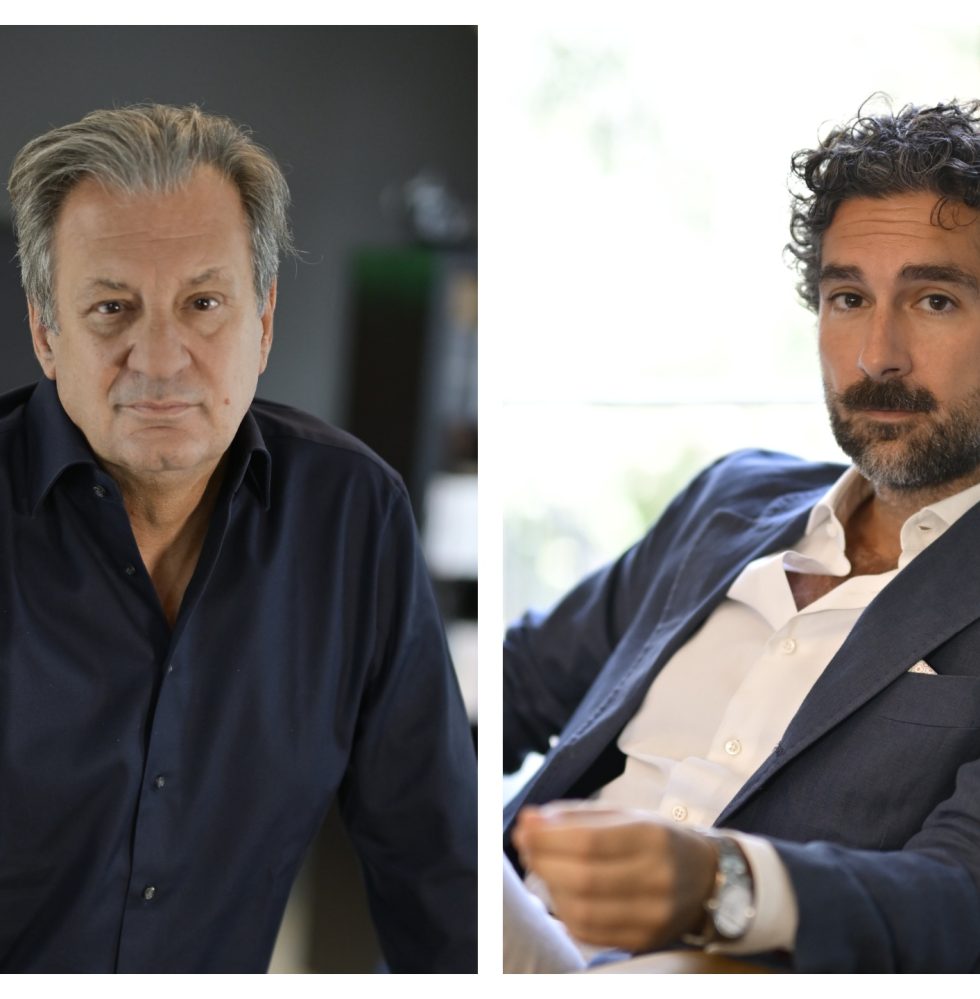
Welcome to Deadline’s International Disruptors, a feature where we shine a spotlight on key executives and companies outside of the U.S. shaking up the offshore marketplace. This week we’re talking to Fabrizio Donvito and Daniel Campos Pavoncelli at Milan and Rome-based Indiana Production. The pair reflect on their experiences driving Netflix-backed The Leopard adaptation and how it paves the way for further ambitious Italian-language productions.
With its majestic Sicilian landscapes, 19th-Century palace settings, sumptuous party scenes and ensemble cast led by Kim Rossi Stuart and Benedetta Porcaroli, this year’s Netflix-backed adaptation of Giuseppe Tomasi Di Lampedusa’s historical novel The Leopard is one of Italy’s most ambitious costume dramas series to date.
The show, which launched on Netflix in March, was the brainchild of Indiana Production co-founder Fabrizio Donvito and the company’s Head of Film and TV Daniel Campos Pavoncelli.
The pair hatched the plan for the adaptation in Atlanta, Georgia in 2016, some 5,000 miles (8,000 kilometers) from the novel’s Mediterranean island setting, while on the set of Italian director Paolo Virzì’s English-language drama The Leisure Seeker starring Donald Sutherland and Helen Mirren.
“We were in Atlanta for four, five months and Daniel and I started brainstorming,” recounts Donvito. “We were looking for an idea for an epic series rooted in Italian culture with an aristocratic angle in the vein of Downton Abbey and The Crown.”
It was during these conversations that they hit on the idea of a series adaptation of The Leopard, capturing the decline of Sicilian aristocracy in the mid 1800s through the figure of Don Fabrizio Corbèra, the last Prince of Salina.
“We were passionate about the novel but at the same time very aware that we were touching something considered untouchable, especially given the legacy of the film,” says Pavoncelli, alluding to Luchino Visconti’s 1963 classic feature starring Burt Lancaster, Claudia Cardinale and Alain Delon.
“We knew we had to somehow forget the film,” he continues. “We both went back and re-read the novel, falling in love with it again, looking at its every detail.”
An early idea was for the series to put a greater accent on the social and political changes of the 1860s interwoven into the novel, set in the tumultuous years around Italy’s reunification, in a move that would see the drama chime with contemporary debates around nationality and identity in Italy and beyond.
The first hurdle was negotiating the adaptation rights with Italian publisher Feltrinelli, which represented Lampedusa’s adopted son Gioacchino Lanza Tomasi and the novel’s rightsholder, who has since died.
Under Italian copyright rules, exclusive rights run for the lifetime of the author and then another 70 years after their death, meaning The Leopard will enter the public domain in 2027 given Lampedusa died in 1957.
“We were among six projects – international and Italian – vying for the rights. I think we managed to convince Carlo Feltrinelli [Feltrinelli’s CEO] and then Gioacchino Lanza Tomasi with our ambition and passion,” says Donvito.
“We had a very clear vision in terms of the budget we were aiming for and type of talent we wanted to work with… that’s why it took us so long. We had the best of the best,” he says, citing key crew members such such as production designer Dimitri Capuani (Io Capitano, L’Immensita and Pinocchio), art director Roberta Federico (Conclave) and co-costume designer Carlo Poggioli (Parthenope, The New Pope).
“We presented the family and Feltrinelli with a document laying out our grand lines but there were no details. I think we also won them over with our promise to shoot in Sicily.”
Concurrently, Donvito and Pavoncelli set about seeking writers and producing partners. At first exploring Italian broadcaster options, the pair ultimately decided they wanted to make the show in collaboration with U.K. partners.
“It became our goal because of the country’s strong writing and costume drama traditions,” says Donvito.
Another deciding factor was the introduction via a mutual contact to Will Gould and Matthew Read at Moonage Pictures, whose credits include The Gentlemen and A Good Girl’s Guide to Murder.
“They convinced us and also introduced us to Richard Warlow,” says Donvito. “I knew his name because among other things, he wrote the amazing show Ripper Street, which never came out in Italy, but I watched on Apple TV via an American account.”
Warlow bought into Donvito and Pavoncello’s desire to explore the political themes in the novel and also added a stronger female dimension by expanding the role of Fabrizio Corbèra’s beloved older daughter Concetta (Porcaroli).
“Concetta is less prominent in the novel. You only really see her as an adult in the final part. We thought that following the trajectory of Concetta alongside that of Don Fabrizio was an interesting way to give the story a fresh angle more in tune with today,” says Pavoncelli.
Warlow in turn introduced the series’ lead director Tom Shankland to the project, after he talked about the screenplay, while they were working together on true crime drama The Serpent.
Netflix’s boarding of the project in 2000 was driven by VP of Italian Originals Chief Eleonora ‘Tinny’ Andreatta, who had recently joined the platform from state broadcaster Rai, where she commissioned dramas like My Brilliant Friend.
“She called us and asked how we were getting on with the project… by the time they boarded we have done a lot of development independently, but they were equally passionate about the project, so we advanced together in absolute harmony with the same vision,” says Donvito.
The partners considered shooting the series in English for a time but ultimately decided that to maintain the authenticity of the storytelling it had to be made in Italian.
Donvito and Pavoncelli say that the wider repercussions of the series in Italy’s cultural landscape have further vindicated this decision.
The novel climbed back into the top 20 bestsellers list in Italy on the show’s launch; while Netflix backed an academic conference looking at the role of culture in bringing about change at the time of the setting of The Leopard, and state broadcaster Rai made Visconti’s film available on its Raiplay streaming platform.
“There was a larger cultural movement around the launch of the drama, which was one of our objectives,” says Donvito.
The show also gained traction with a younger demographic and on the social networks thanks to the presence of upcoming stars such as Saul Nanni as Trancredi Falconieri and Deva Cassel as Angelica Sedara, who both have large followings on Instagram
Outside of Italy, The Leopard did not enjoy the same runaway success as recent Netflix hits such as Adolescence, but Donvito and Pavoncelli are still happy with the show’s performance.
“We’re proud of the series which was made with a lot of love and passion, and we’re sure that more and more people will come to discover it over time… it will have a long tail,” says Donvito.
He also points to the show’s soft power as it screened in embassies and consulates across Europe and the U.S. this spring.
The Leopard marked a first major series for the veteran producer.
Starting out as a fashion photographer before moving into producing in the early 1990s, with a stint at Gabriele Salvatores and Maurizio Totti’s Colorado Film, Donvito co-founded Milan and Rome-based Indiana Production with Marco Cohen in 2005. They were joined later by Benedetto Habib, Karim Bartoletti and lastly, Pavoncelli in 2015.
London-born Italian British producer Pavoncelli began his career in sales and producing in the UK, before moving to Milan to work with Indiana.
Prior to The Leopard, the company racked up more than 50 feature credits, including Virzi’s The First Beautiful Thing and Human Capital, Giorgio Diritti’s Lubo, Liliana Cavani’s The Order of Time, Gabriele Salvatores’ Casanova’s Return and Mario Martone’s Massimo Troisi bio-doc Somebody Down There Likes Me.
Donvito and Pavoncelli both see The Leopard as paving the way for more ambitious Italian-language film and TV projects inspired by strong Italian IP.
“There’s been a market contraction and getting shows like The Leopard off the ground has become more difficult. You need a partner who backs your ambition, and we were lucky to connect with Netflix,” says Pavoncelli. “But we’re developing a number of prestigious series projects that we hope to bring to fruition.”
The company is also in post-production two features: Virzì’s Tuscany-set intergenerational drama Cinque Secondi, featuring Valerio Mastandrea, Galatea Bellugi and Valeria Bruni Tedeschi in the cast; and Andrea Di Stefano’s My Tennis Maestro, starring Pierfrancesco Favino as an unconventional coach.
It is also developing a biopic devoted to legendary Italian Rome, Open City actress Anna Magnani, which will be directed by Alessio Cremonini (On My Skin), who is also writing the screenplay with the late star’s grand-daughter, actress Olivia Magnani.
This fall will mark 20 years since Indiana Production launched and when quizzed on how the company plans to mark the anniversary, Donvito says: “Pulling off a drama like The Leopard with its quality and artistic vision is the best form of celebration.”



